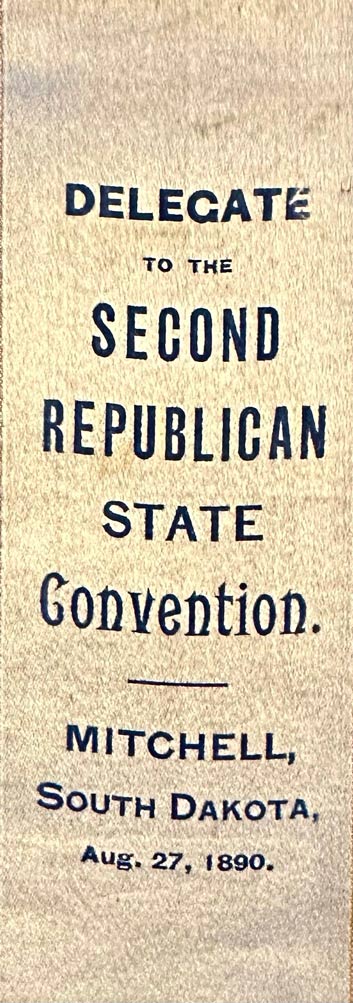
|
- 1889 – September 4, Huron
- 1890 – August 27, Mitchell
- 1891 – September 29, Aberdeen
(Special to fill Cong. vacancy)
- 1892 – July 27, Madison
- 1894 – August 25, Yankton
- 1896 – July 8-9, Aberdeen
- 1898 – August 24-25, Mitchell
- 1900 – May 23, Sioux Falls
- 1902 – June 4, Sioux Falls
- 1904 – May 4, Sioux Falls
- 1906 – June 6, Sioux Falls
- 1908 – July 18, Mitchell
- 1910 – July 5, Sioux Falls
- 1912 – July 2, Huron
- 1914 – January 5, Pierre
- 1916- July 5, Huron
- 1918- July 2-3, Sioux Falls
- 1920 – August 9, Huron
- 1921 – December 7, Pierre
- 1924 – July 18, Huron
- 1926 – December 1, Pierre
- 1928 – August 17, Huron
- 1930 – May 20, Pierre
- 1932 – May 24, Pierre
- 1934 – May 29, Pierre
- 1936 – June 2, Pierre
- 1938 – June 27, Pierre
- 1940 – July 22, Pierre
- 1942 – June 6 – Pierre
- 1944 – May 29, Watertown
- 1946 – July 8, Pierre
- 1948 – July 12, Pierre
- 1950 – July 17, Pierre
- 1952 – July 21, Pierre
- 1954 – July 26, Pierre
- 1956 – July 16, Pierre
- 1958 – July 14, Pierre
- 1960 – August 1, Pierre
- 1962 – July 15-16, Pierre
- 1964 – August 1, Pierre
- 1966 – July 30, Pierre
- 1968 – July 15, Pierre
- 1970 – July 13, Pierre
- 1972 – June 26, Pierre
- 1974 – July 13, Rapid City
- 1976 – July 10, Pierre
- 1978 – June 22, Sioux Falls
- 1980 – June 27-28, Aberdeen
- 1982 – June 24-26, Yankton
- 1984 – June 28, Rapid City
- 1986 – June 28, Mitchell
- 1988 – June 22, Watertown
- 1990 – June 29, Sioux Falls
- 1992 – June 26, Spearfish
- 1994 – June 24, Pierre
- 1996 – June 27-29, Aberdeen
- 1998 – June 25, Pierre
- 2000 – June 22-24, Spearfish
- 2002 – June 21-22, Sioux Falls
- 2004 – January 23-24, Sioux Falls
(Special to fill Cong. vacancy)
- 2004 – June 24-26, Mitchell
- 2006 – June 22-24, Watertown
- 2008 – June 19-21, Oacoma
- 2010 – June 25-26, Huron
- 2012 – June 21-24, Sioux Falls
- 2014 – June 19-21, Rapid City
- 2016 – June 24-25, Aberdeen
- 2018 – June 21-23, Pierre
- 2020 – June 19-20 “Virtual Convention”
- 2022 – June 23-25, Watertown
- 2024 – June 5-8, Pierre
|


Yes, it was a struggle.From about 1975 on, the Territory has enough population for the Congress to direct that the process for a territory to become a State begin. They did not do so. The State was too raw, the Legislature filled with speculators, thieves, and, even murderers..The federally appointed Territorial Secretary, General McCook, was gunned down in the street in Yankton. The issue was railroad bonding. When Cleveland a Republican was elected, the Statehood issue ended as Democrats did not want one or two new Republican States. Governor Nehemiah Ordway, a stockholder in the northern Railroad moved the Territorial Capital to Bismarck. It took ten years to resolve all the conflict.It wasn’t until Governor Mellette turned out the corrupt “Yankton Ring” and favored the equally shady “Sioux Falls Ring” thatbantwo state proposal found favor in Washington.
Sorry..Cleveland was, of course, a Democrat. He served two non consecutive terms.